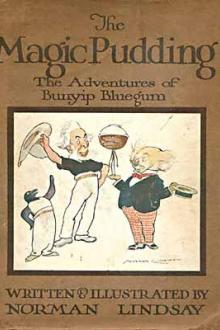The Magic Pudding, Norman Lindsay [beach read txt] 📗

- Author: Norman Lindsay
- Performer: -
Book online «The Magic Pudding, Norman Lindsay [beach read txt] 📗». Author Norman Lindsay
The Project Gutenberg EBook of The Magic Pudding, by Norman Lindsay
Copyright laws are changing all over the world. Be sure to check the copyright laws for your country before downloading or redistributing this or any other Project Gutenberg eBook.
This header should be the first thing seen when viewing this Project Gutenberg file. Please do not remove it. Do not change or edit the header without written permission.
Please read the “legal small print,” and other information about the eBook and Project Gutenberg at the bottom of this file. Included is important information about your specific rights and restrictions in how the file may be used. You can also find out about how to make a donation to Project Gutenberg, and how to get involved.
**Welcome To The World of Free Plain Vanilla Electronic Texts**
**eBooks Readable By Both Humans and By Computers, Since 1971**
*****These eBooks Were Prepared By Thousands of Volunteers!*****
Title: The Magic Pudding
Author: Norman Lindsay
Release Date: January, 2004 [EBook #4910] [Yes, we are more than one year ahead of schedule] [This file was first posted on March 26, 2002]
Edition: 10
Language: English
Character set encoding: ASCII
*** START OF THE PROJECT GUTENBERG EBOOK, THE MAGIC PUDDING ***
This eBook was produced by Geoffrey Cowling.
The Magic Pudding: Being the Adventures of Bunyip Bluegum and his friends Bill Barnacle and Sam Sawnoff
by
Norman Lindsay
[ Bunyip Bluegum ] [ and his Uncle ] [ are koalas ] [ ]
This is a frontways view of Bunyip Bluegum and his Uncle Wattleberry. At a glance you can see what a fine, round, splendid fellow Bunyip Bluegum is, without me telling you. At a second glance you can see that the Uncle is more square than round, and that his face has whiskers on it.
Looked at sideways you can still see what a splendid fellow Bunyip is, though you can only see one of his Uncle’s whiskers.
Observed from behind, however, you completely lose sight of the whiskers, and so fail to realize how immensely important they are. In fact, these very whiskers were the chief cause of Bunyip’s leaving home to see the world, for, as he often said to himself—
“Whiskers alone are bad enough Attached to faces coarse and rough But how much greater their offence is When stuck on Uncles’ countenances.”
The plain truth was that Bunyip and his Uncle lived in a small house in a tree, and there was no room for the whiskers. What was worse, the whiskers were red, and they blew about in the wind, and Uncle Wattleberry would insist on bringing them to the dinner table with him, where they got in the soup.
Bunyip Bluegum was a tidy bear, and he objected to whisker soup, so he was forced to eat his meals outside, which was awkward, and besides, lizards came and borrowed his soup.
His Uncle refused to listen to reason on the subject of his whiskers. It was quite useless giving him hints, such as presents of razors, and scissors, and boxes of matches to burn them off. On such occasions he would remark—
“Shaving may add an air that’s somewhat brisker, For dignity, commend me to the whisker.”
Or, when more deeply moved, he would exclaim—
“As noble thoughts the inward being grace, So noble whiskers dignify the face.”
Prayers and entreaties to remove the whiskers being of no avail, Bunyip decided to leave home without more ado. The trouble was that he couldn’t make up his mind whether to be a Traveller or a Swagman. You can’t go about the world being nothing, but if you are a traveller you have to carry a bag, while if you are a swagman you have to carry a swag, and the question is: Which is the heavier?
At length he decided to put the matter before Egbert Rumpus Bumpus, the poet, and ask his advice. He found Egbert busy writing poems on a slate. He was so busy that he only had time to sing out,
“Don’t interrupt the poet, friend, Until his poem’s at an end,”
and went on writing harder than ever. He wrote all down one side of the slate and all up the other, and then remarked,
“As there’s no time to finish that, The time has come to have our chat. Be quick, my friend, your business state Before I take another slate.”
“The fact is,” said Bunyip, “I have decided to see the world, and I cannot make up my mind whether to be a Traveller or a Swagman. Which would you advise?”
Then said the Poet—
“As you’ve no bags it’s plain to see A traveller you cannot be; And as a swag you haven’t either You cannot be a swagman neither. For travellers must carry bags, And swagmen have to hump their swags Like bottle-ohs or ragmen. As you have neither swag nor bag You must remain a simple wag, And not a swag-or bagman.”
“Dear me,” said Bunyip Bluegum, “I never thought of that. What must I do in order to see the world without carrying swags or bags?”
The Poet thought deeply, put on his eyeglass, and said impressively—
“Take my advice, don’t carry bags, For bags are just as bad as swags; They’re never made to measure. To see the world, your simple trick Is but to take a walking-stick Assume an air of pleasure, And tell the people near and far You stroll about because you are A Gentleman of Leisure.”
“You have solved the problem,” said Bunyip Bluegum, and wringing his friend’s hand, he ran straight home, took his Uncle’s walking-stick, and, assuming an air of pleasure, set off to see the world.
He found a great many things to see, such as dandelions, and ants, and traction engines, and bolting horses, and furniture being removed, besides being kept busy raising his hat, and passing the time of day with people on the road, for he was a very well-bred young fellow, polite in his manners, graceful in his attitudes, and able to converse on a great variety of subjects, having read all the best Australian poets.
Unfortunately, in the hurry of leaving home, he had forgotten to provide himself with food, and at lunch time found himself attacked by the pangs of hunger.
“Dear me,” he said, “I feel quite faint. I had no idea that one’s stomach was so important. I have everything I require, except food; but without food everything is rather less than nothing.
“I’ve got a stick to walk with. I’ve got a mind to think with. I’ve got a voice to talk with. I’ve got an eye to wink with. I’ve lots of teeth to eat with, A brand new hat to bow with, A pair of fists to beat with, A rage to have a row with. No joy it brings To have indeed A lot of things One does not need. Observe my doleful-plight. For here am I without a crumb To satisfy a raging turn 0 what an oversight!”
As he was indulging in these melancholy reflections he came round a bend in the road, and discovered two people in the very act of having lunch. These people were none other than Bill Barnacle, the sailor, and his friend, Sam Sawnoff, the penguin bold.
Bill was a small man with a large hat, a beard half as large as his hat, and feet half as large as his beard. Sam Sawnoff’s feet were sitting down and his body was standing up, because his feet were so short and his body so long that he had to do both together. They had a pudding in a basin, and the smell that arose from it was so delightful that Bunyip Bluegum was quite unable to pass on.
“Pardon me,” he said, raising his hat, “but am I right in supposing that this is a steak-and-kidney pudding?”
“At present it is,” said Bill Barnacle.
“It smells delightful,” said Bunyip Bluegum.
“It is delightful,” said Bill, eating a large mouthful.
Bunyip Bluegum was too much of a gentleman to invite himself to lunch, but he said carelessly, “Am I right in supposing that there are onions in this pudding?”
Before Bill could reply, a thick, angry voice came out of the pudding, saying—
“Onions, bunions, corns and crabs, Whiskers, wheels and hansom cabs, Beef and bottles, beer and bones, Give him a feed and end his groans.”
“Albert, Albert,” said Bill to the Puddin’, “where’s your manners?”
“Where’s yours?” said the Puddin’ rudely, “guzzling away there, and never so much as offering this stranger a slice.”
“There you are,” said Bill. “There’s nothing this Puddin’ enjoys more than offering slices of himself to strangers.”
“How very polite of him,” said Bunyip, but the Puddin’ replied loudly—
“Politeness be sugared, politeness be hanged, Politeness be jumbled and tumbled and banged. It’s simply a matter of putting on pace, Politeness has nothing to do with the case.”
“Always anxious to be eaten,” said Bill, “that’s this Puddin’s mania. Well, to oblige him, I ask you to join us at lunch.”
“Delighted, I’m sure,” said Bunyip, seating himself. “There’s nothing I enjoy more than a good go in at steak-and-kidney pudding in the open air.”
“Well said,” remarked Sam Sawnoff, patting him on the back. “Hearty eaters are always welcome.”
“You’ll enjoy this Puddin’,” said Bill, handing him a large slice. “This is a very rare Puddin’.”
“It’s a cut-an’-come-again Puddin’,” said Sam.
“It’s a Christmas steak and apple-dumpling Puddin’,” said Bill.
“It’s a —. Shall I tell him?” he asked, looking at Bill. Bill nodded, and the Penguin leaned across to Bunyip Bluegum and said in a low voice, “It’s a Magic Puddin’.”
“No whispering,” shouted the Puddin’ angrily. “Speak up. Don’t strain a Puddin’s ears at the meal table.”
“No harm intended, Albert,” said Sam, “I was merely remarking how well the crops are looking. Call him Albert when addressing him,” he added to Bunyip Bluegum. “It soothes him.”
“I am delighted to make your acquaintance, Albert,” said Bunyip.
“No soft soap from total strangers,” said the Puddin’, rudely.
“Don’t take no notice of him, mate,” said Bill, “That’s only his rough and ready way. What this Puddin’ requires is politeness and constant eatin’.”
They had a delightful meal, eating as much as possible, for whenever they stopped eating the Puddin’ sang out
“Eat away, chew away, munch and bolt and guzzle, Never leave the table till you’re full up to the muzzle.”
But at length they had to stop, in spite of these encouraging remarks, and as they refused to eat any more, the Puddin’ got out of his basin, remarking—“If you won’t eat any more here’s giving you a run for the sake of exercise,” and he set off so swiftly on a pair of extremely thin legs that Bill had to run like an antelope to catch him up. “My word,” said Bill, when the Puddin’ was brought back. “You have to be as smart as paint to keep this Puddin’ in order. He’s that artful, lawyers couldn’t manage him. Put your hat on, Albert, like a little gentleman,” he added, placing the basin on his head. He took the Puddin’s hand, Sam took the other, and they all set off along the road. A peculiar thing about the Puddin’ was that, though they had all had a great many slices off him, there was no sign of the





Comments (0)